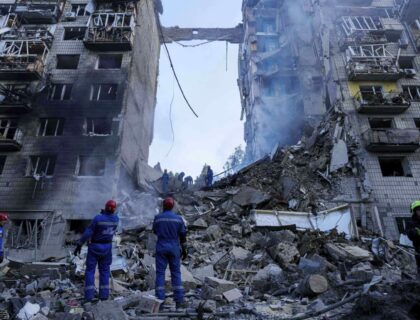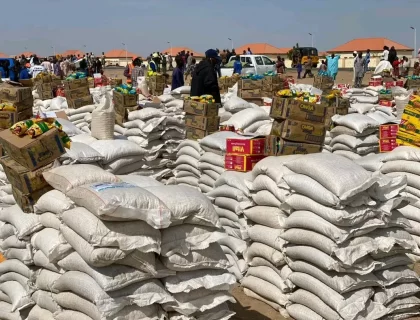Over 971 Nigerians Abducted in October 2024 – Report
In October 2024, a total of 971 Nigerians were abducted across the country, according to the “October 2024 Nigeria Security Report” by Beacon Security and Intelligence Limited (BSIL).
This data highlights a troubling rise in insecurity, with the report warning that 2024 could be the worst year for security in Nigeria in nearly a decade.
The report indicates a significant increase in violent incidents, including killings and kidnappings for ransom, mainly attributed to non-state armed groups (NSAGs), criminal gangs, ethnic militias, and social unrest driven by the country’s socio-economic and political turmoil.
Notably, fatalities saw a 51% rise, and abductions increased by 24.42% compared to previous months.
Out of 861 recorded security incidents in October, 64.92% (559 incidents) were security-related threats, 24.79% (215) were security forces operations, and 4.99% (43) were safety incidents.
The month also saw 1,545 fatalities, with 67.7% of these attributed to civilians, 25.89% to NSAGs, and 6.4% to security forces.
The North East and North West regions were the hardest hit by security issues, accounting for 52.03% of the total incidents, while the South East reported the least incidents at 7.78%.
“The number of individuals abducted increased from 807 in September 2024 to 971 in October 2024, marking a 20.32% increase and a shift from the 11.03% decline recorded in September 2024.
“The North West was the hardest hit, with 83.83% of all abductions occurring in this region, while the South West region experienced the least number of abductions with 0.21%.
“Of the total number of abducted individuals, Northern Nigeria accounted for 954 (98.25%), while Southern Nigeria accounted for 17 (1.75%),” the report added.
The report further revealed that fatalities in October 2024 rose by 51.17%, with the number of individuals killed increasing from 1,022 in September to 1,545 in October.
The North West (37.93%) and North Central (28.16%) regions recorded the highest increases in fatalities, collectively accounting for 66.09% of the total fatalities across the country.
In terms of regional distribution, Northern Nigeria was the most affected, with 1,283 fatalities (83.04% of the total), while Southern Nigeria accounted for 262 fatalities (16.96%).
The South-South region had the lowest fatality rates, at just 3.56%. This distribution highlights the severe security challenges faced by northern parts of Nigeria in comparison to the southern regions.
In an interview, Dr. Kabir Adamu, the CEO of Beacon Security and Intelligence Limited, highlighted the weakness and ineffectiveness of Nigeria’s security management system.
He explained that this weakness is one of the key reasons the country has struggled to address both the root causes and manifestations of insecurity effectively.
Dr. Adamu expressed concern over the deteriorating security situation, warning that if the current trajectory persists, Nigeria could face even more fatalities in the future.
He stressed the urgent need for significant improvements in the country’s security framework to stem the tide of violence and insecurity.
“We just published our October report. What it says is that the situation has really deteriorated, and we are a bit alarmed with the rate of deterioration.
“If it continues at this rate, perhaps what we are likely to get is more fatality in Nigeria in the last 10 months, if this trajectory that we are seeing continues.
“There are three reasons driving insecurity. The socio-economic factor, the cost of living crisis that we are experiencing and other socioe-conomic issues.
“Then the political issue, for instance, the off-cycle election, and the outcome of the 2023 election.
“For the fact that some people felt aggrieved they didn’t get the justice they deserved and now kind of sabotaging the government as it were.
“The last one is the environmental factor; the climate change issue that is causing both internal and external factors in the movement of transhuman, herders, and geopolitics in the Sahel region. Such are responsible for the rise in insecurity.
“Of course, for the fact we don’t have a security management system in place to address these factors, both the drivers and the triggers, as well as the root causes are also other factors.
“We have a very weak and ineffective security management system that has not been able to address the root causes and manifestation of insecurities in the country.
“Our criminal justice system is ineffective that people feel that when they complain or take their case, especially to the law enforcement, they are not heard. A significant number of those people will rather pick guns to get their pound of flesh.
“It’s a failure of our security strategy. We have at least three laws in the country that are meant to prevent terrorism. Number one is the National Counter-Terrorism Strategy (NACTEST) that was passed in 2016. Policy Framework and National Action Plan for Preventing and Countering Violent Extremism (P/CVE) launched in 2017.
“Another one is Terrorism Preventing and Prohibition Act (2022) – NCTC, which was amended in 2022. If you read them, there are at least five elements: to forestall, to secure, to identify, to prevent, and then to implement.
“First we would have to address current challenges in terrorism that we have. And more importantly, we would have prevented new one from emerging.
“Under these five elements that I mentioned, they include securing our borders, they include forming a partnership with our neighbouring countries like Niger, Chad, Benin Republic, Cameroon. Because we did not implement it, most Nigerians are not even aware of the existence of these documents.
“Government has failed in buying the minds of Nigerians to the extent that Nigerians would be supportive of these three documents.
“And when you have a terrorism challenge, remember that in terrorism there are three elements. We have the government, audience (Nigerians) and the perpetrators.
“Both the perpetrators and the government are speaking to the audience, where the government fails to get influence over the audience, then the perpetrators will get influence over the audience.
“Because we haven’t communicated in a strategic manner the content of these three documents, to the extent that the market woman in the place where these Lakurawa emerged does not even know which number to call or whom to approach if she sees a member of Lakurawa. That’s the failure of governance.”
You may be interested

West Ham Forward Michaël Antonio Returns To Football Six Months After Near-Fatal Ferrari Crash That Shattered His Leg
gisthub - Jun 17, 2025Michail Antonio made his return to football for the first time since his near-fatal car crash in December. The 35-year-old came off the…

Banned Herbicide Linked To Male Feminization Found In Nigerian Markets – Centre For Food Safety And Agricultural Research Raises Alarm
gisthub - Jun 17, 2025The Centre for Food Safety and Agricultural Research (CEFSAR) has raised concerns over the sale of Atrazine in Nigeria — a herbicide banned…

Elon Musk Reveals Drug Test Results After Report Claims He Uses ‘Cocktail Of Substances’
gisthub - Jun 17, 2025Elon Musk has shared the results of a recent drug test after a shocking report accused him of using multiple illegal drugs while…














Leave a Comment